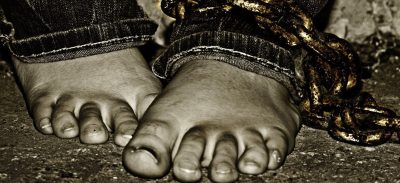
By Cian Molloy - 21 January, 2019

The Vatican has published a new resource aimed at preventing and eradicating human trafficking.
In the 21st century, tens of thousands of people are still bought and sold as chattels to be cruelly exploited and deprived of liberty and proper human dignity.
Speaking out against modern-day slavery has been a mark of the papacy of Pope Francis. A collection of his teachings on migrants, refugees and human trafficking, Light on the Ways of Hope, was published this week at the same time as the new resource, Pastoral Orientations on Human Trafficking.
Despite the 34-page document’s clumsy-sounding title, the resource contains a concise synopsis of the growing problem of human trafficking in the world today and why we are morally obliged to combat it. Many will find the contents of the booklet inspiring.
Human trafficking takes control over its victims and puts them in locations and situations where they are treated as commodities, says the document. Victims are bought and sold and exploited as “raw materials” in multiple and unimaginable ways.
“Until recent times, such treatment was associated with colonialism and the slave trade,” the document says. “Despite the formal abolition of the latter, the exploitation of some human beings by others has not ended and now takes place in terrible new forms on a significantly large scale.”
One of the drivers in this cruel trade is the demand for cheap labour, in agriculture, domestic work and the sex trade. The resource says that those who use women trafficked into prostitution “share real responsibility for the destructive aspect of their behaviour”.
But to reduce the demand that drives human trafficking, accountability, prosecution and punishment are needed along the entire chain of exploitation, from the recruiters and traffickers to the consumers.
In addition to prostitution, other abuses by traffickers include child abduction and trading, trade in human organs, forced marriages and forced begging.
One of the difficulties facing those tackling human trafficking is that current business models obscure its existence. “Human trafficking is often hidden within the labyrinth of supply chains. Increasingly competitive markets compel firms to cut labour costs and access raw materials at the lowest possible price. The demand for cheap goods based on cheap labour needs to be promptly and properly addressed.
“Catholic business leaders should put the Church’s teachings into practice by providing decent working conditions and adequate pay to support one’s family:”
One key factor identified in the document is that the line between migrant smuggling and human trafficking is becoming thinner. The resource points out the dire effect of “Fortress Europe”-type policies on desperate people, who begin as clients of smugglers only to become victims of traffickers.
The Vatican document recommends: “To prevent people from resorting to the services of smugglers and falling into the hands of traffickers, one should first of all ensure that they do not feel forced to leave their homelands. The most radical form of prevention is, thus, upholding the right to remain in one’s country and place of origin and ensuring that people have access there to basic goods and integral human development.”
The new resource can be viewed online. Pope Francis’s teachings on migrants, refugees and human trafficking can also be accessed online.